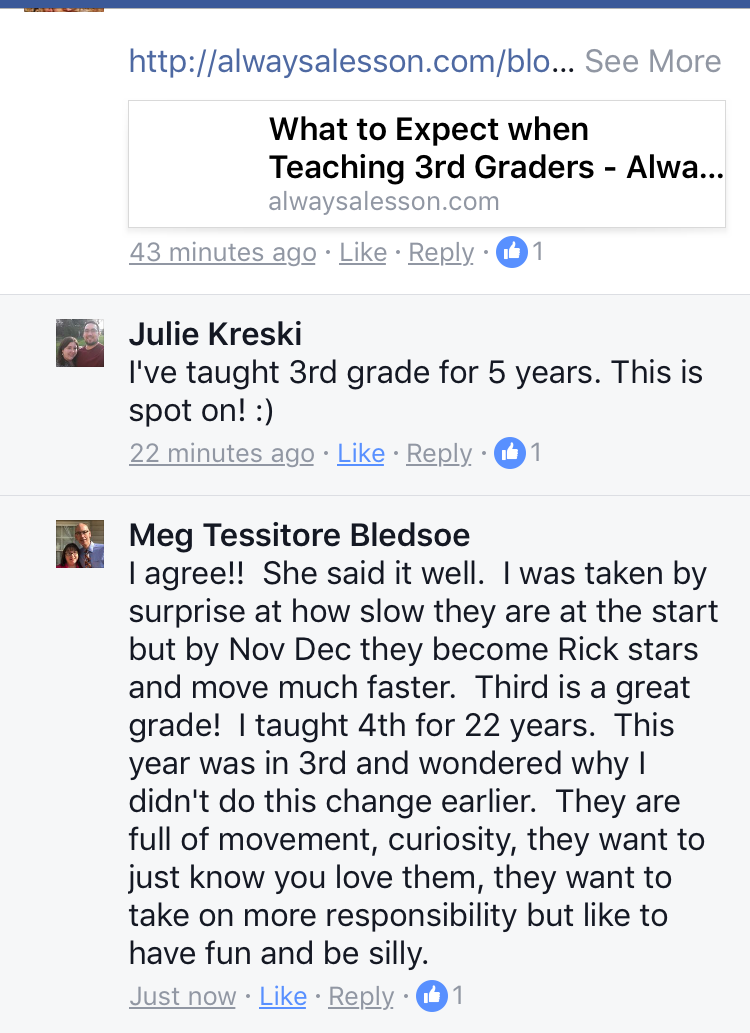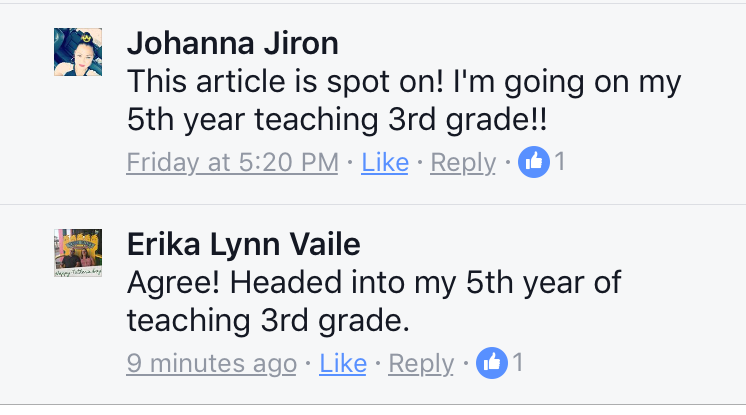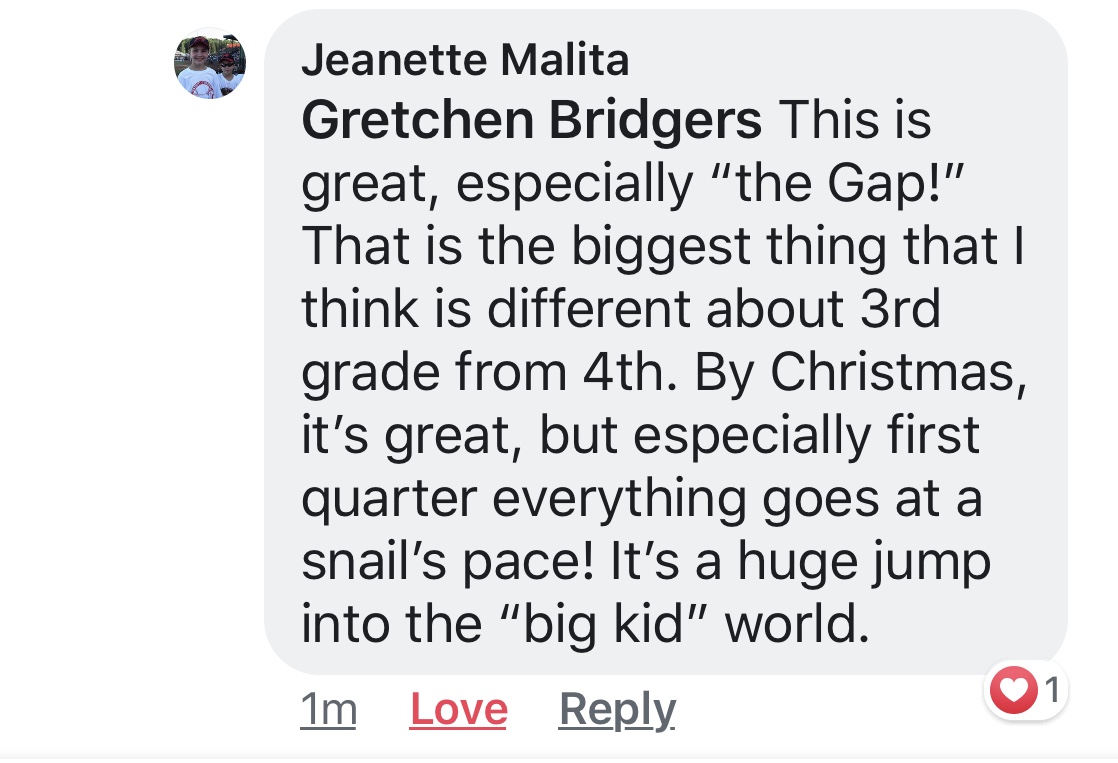What to Expect when Teaching 3rd Graders
I taught elementary school grades for 8 years before moving into a coaching role. I was lucky enough to move around to grades 2nd, 3rd and 5th. If you have the opportunity to teach multiple grade levels during your journey, I highly suggest it. It really helped me better understand what I needed to do as the teacher to best prepare my kiddos for the next grade level.
 My first teaching job was in third grade where I remained for three years before helping out our “challenging behavior” fifth grade class which was followed by me begging to go to second the following year to rejuvenate. 🙂 A year later, I switched schools to try out a different population of students (I highly recommend doing this in your career too!) and landed right back in my safe place- third grade.
My first teaching job was in third grade where I remained for three years before helping out our “challenging behavior” fifth grade class which was followed by me begging to go to second the following year to rejuvenate. 🙂 A year later, I switched schools to try out a different population of students (I highly recommend doing this in your career too!) and landed right back in my safe place- third grade.
I always LOVED third grade and got pretty good at it, just like anything in life that you have the opportunity to do over and over again. Of course, no two years were the same, but as I was growing in instructional best practices, I was gaining peace of mind knowing what to expect and that was quite a gift.
Now that I work with new teachers, one question I get asked often is…”what’s it like to teach [insert grade level]? “Every time I find myself repeating an answer to a question, I realize I need to publish a blog post about it because that means there are probably people out there wondering the same thing. With new teachers, I try my best to help them visualize their year prior to embarking on it so that they can begin the problem solving process before they are in the moment. This helps ease fears and eliminate the “freeze” moment in front of students.
In efforts to help anyone embarking on teaching third grade visualize what the year may hold, I compiled a list of expectations based on my own personal experience.
So, here goes…
What to Expect when Teaching 3rd Graders
The Gap
The first quarter of third grade is quite trying for many students. They are still 2nd graders who rely heavily on the teacher and their parents. There is little ownership in tasks and personal responsibility is minimal. Reminders were an absolute requirement for students to achieve a task on time or at all really. “The Gap” refers to the immense jump in responsibility from second to third grade, where students go from being told what to do to having to self-regulate and manage their time effectively. Just imagine a class of students running into a brick wall at recess and falling to the ground in tears… that is the feeling of trying to survive the first quarter. The high expectations are overwhelming to students because of the drastic shift in requirements from a non-testing grade (2nd) to a testing grade (3rd). It’s fast paced, crammed with content and assessment, and so many materials and assignments to keep up with that kiddos quickly realize third grade is no joke. Every year I say “these kids are babies, more helpless and younger than ever before,” but by 2nd quarter its like magic- everyone is on the bus and the bus is running at the maximum speed limit! Consistency and support allow these students to rise to the occasion.
A few examples of daily obstacles due to “The Gap” are listed below:
- I had students record their homework in their agendas daily and it could take anywhere up to 15 minutes to write down 3 tasks, such as “read 20 minutes,” “math worksheet,” and “write spelling words 3 x each.” They had never had to do it before and struggled to do it quickly and independently (just imagine one assignment being written so large it took up the entire week on the calendar, followed by multiple erase marks and tears in the paper). I quickly ran down to the second grade teachers begging them to require students to write down their homework in their agenda, but they felt it was too difficult and time consuming so they continued to create and hand out a homework schedule to their students. One teacher, however, saw the benefit (and probably the desperation on my face) and ensured her students wrote down their homework in their agenda during the 4th quarter. Man, were those kids well adjusted to responsibility of third grade when they arrived!
- “Where’s your homework?” I would often ask and a student’s response would often be “well my mom/dad must have not put it in my backpack.” WHAT?! I had to explain that homework was not for their mommy or daddy, but it was their responsibility to bring it home, complete it and bring it back to school- end of story. You would have thought I was speaking another language by the horror on their face. They had never imagined such a circumstance where it was all on them to be successful. I think I popped their dream world bubble daily- sorry kiddos!
- Every week our grade level sent home “weekly folders” that held all important test papers from the prior week to be signed by parents. This was to ensure that progress reports and report cards were no surprise since the grades were coming home on a consistent basis each week. The excuses that poured in about why these papers weren’t signed or returned could have filled a book. The common thread between all of the excuses were that students did not take responsibility to a) alert their parents that something needed to be signed or b) did not present the papers to be signed or c) did not follow up to ensure they were signed and back in the backpack prior to walking to school.
- One particular student constantly said he put the folder on the kitchen table to be signed, but it would be missing by morning. “Well, did you ask your mommy or daddy where it was?” I would ask. Their blank stares told me what I needed to know. They never even thought to ask where the folder was and that certainly was of no concern to them. I had to relate the folder to their favorite toy for them to see the importance and suddenly they realized they would never have let the issue go if it was their favorite toy that had gone missing. Suddenly, that folder became like gold and was returned promptly going forward.
- Another child said their mom was “too busy” to sign such papers. After some discussion, I realized the mom was coming home late from work and was rushing to put food on the table, bathe the younger children, and put everyone to bed on time. Totally get it- sounds stressful. When I asked “so what are we gonna do? This is your assignment and its due today,” the child looked at me like I lived on another planet. “She said she was busy, what can I do?” he replied. Well, finally, some engagement and insight into a child’s mindset- try one time and you’re off the hook. “What if we set up a system so that we picked a place in the house where it wouldn’t be in the way but Mommy wouldn’t forget to sign it? Maybe Mommy has time to sign papers after you are in bed and you can get the folder from her in the morning.” BOOM- light bulb went off. “I know! I’ll put it on her nightstand where she has her bills. She can sign it and I can go get it off the table in the morning!” I didn’t want to ruin this beaming moment, but I had to follow up with a probable downfall to our plan. “So what if you open the folder to make sure its signed, which is a good idea by the way, and you find out Mommy didn’t get a chance to sign it?” I think I took the wind out of his sails. “Well, I can ask her to sign it right then, but she probably won’t have time if its already morning.” That is right where I wanted my kiddos- thinking through scenarios and being part of the solution. We talked for a few minutes and decided to get mom in on the plan and find out what would work for her. She loved his idea of the nightstand and agreed if she didn’t have time to sign it, she would write me a note saying he did his part of putting the folder in the right spot and she would return it within 24 hours. I couldn’t have been happier. It was never about the folder. It was about the child taking the ownership to share their academic progress with their parent- which required more than just asking once or handing over a folder without explanation.
Independent but Still Loving School
I could never be a K-2 teacher for very long. To me, it is similar to babysitting and herding cats. Have you ever seen little kids play soccer? There is no organization and just a haphazard pile of children all kicking one ball at the same time. That mayhem is why I love third grade because kiddos are growing out of that stage. They are becoming more independent and like to be referred to as “a big kid.” They don’t want you to help them because their confidence is rising as they take on challenges themselves. It’s a beautiful transformation to watch. But what makes it all the sweeter is that third graders still love school. To them its cool to try hard, impress your teacher, and do all of your work. It’s the best of both worlds- they are little but not too needy and they still love learning and life. What could be better than that stage?
The Testing Monster
Third grade is the first year of accountability in a child’s academic career. In North Carolina, its called a “gateway year” because the End-Of-Grade [EOG] test dictates whether the child progresses to the next grade or has to stay behind a year. Talk about terrifying for an 8/9 year old! The pressure of preparing for a test is big no matter how much we don’t talk about it. Testing involves so much more than just knowing the content. First, they had to recognize that their own personal information was correct on a Scantron sheet which could take hours, mainly because they don’t know their birthday, student ID number, etc. Second, a bubble sheet is a nightmare for a third grader. To remember after answering every question in the test book you must record it on the bubble sheet is like asking them to memorize the constitution in under 5 minutes. So what happens is every few minutes they remember, go back and try to fill in the sheet, which would be fine, but they end up skipping all over the sheet so that it is no way aligned to the answers in the test book and due to that… they fail. Double nightmare for teacher and student. Third, bubbling in a single answer is apparently quite difficult and requires skill and practice- who knew? We had to start incorporating bubbling into daily activities, even if it was just to bubble their name. They would shade outside the lines, circle the bubble, or worse, color in a bubble so dark that changing their answer meant erasing so hard a hole into the entire bubble sheet was created making the entire test ineligible. Ugh- what a pain. Don’t worry though, by the end of the year these kiddos have mastered the Testing Monster and kill it on the EOG test for years to come.
What I have learned mainly is that third graders are resilient. They may come in underprepared, but when you are explicit in teaching expectations, consistently hold them to high standards, and cheer them on along the way they are capable of anything. I love third graders because of how much they grow in a year’s time- more than any other grade. Be sure to capture photos as you can see the transformation happening right before your eyes (and the kids love seeing how little they were when they started out on their journey). Third graders have a special appreciation for their teachers because of how much they go through together in a school year. They often remark “I couldn’t have done this without you” or “thank god you straightened me out!” LOL. They are loving, smart and hilariously funny. [If you haven’t ever read my “Students Say The Darndest Things” blog post series, stop by and have a laugh!]. I loved being a third grade teacher and wouldn’t trade it for the world- even if it it means slaying the Testing Monster and building a bridge across The Gap!
If you are new to third grade and are in need of resources, browse below:
Or grab this growing MEGA BUNDLE for resources in all of the subject areas!
Or grab some 3rd grade swag here.
What expectation for teaching third grade would you add to the list?
See What Other Educators are Saying:
This post was shared in public Facebook groups for third grade teachers. Below is feedback from other third grade teachers in regards to this post:







